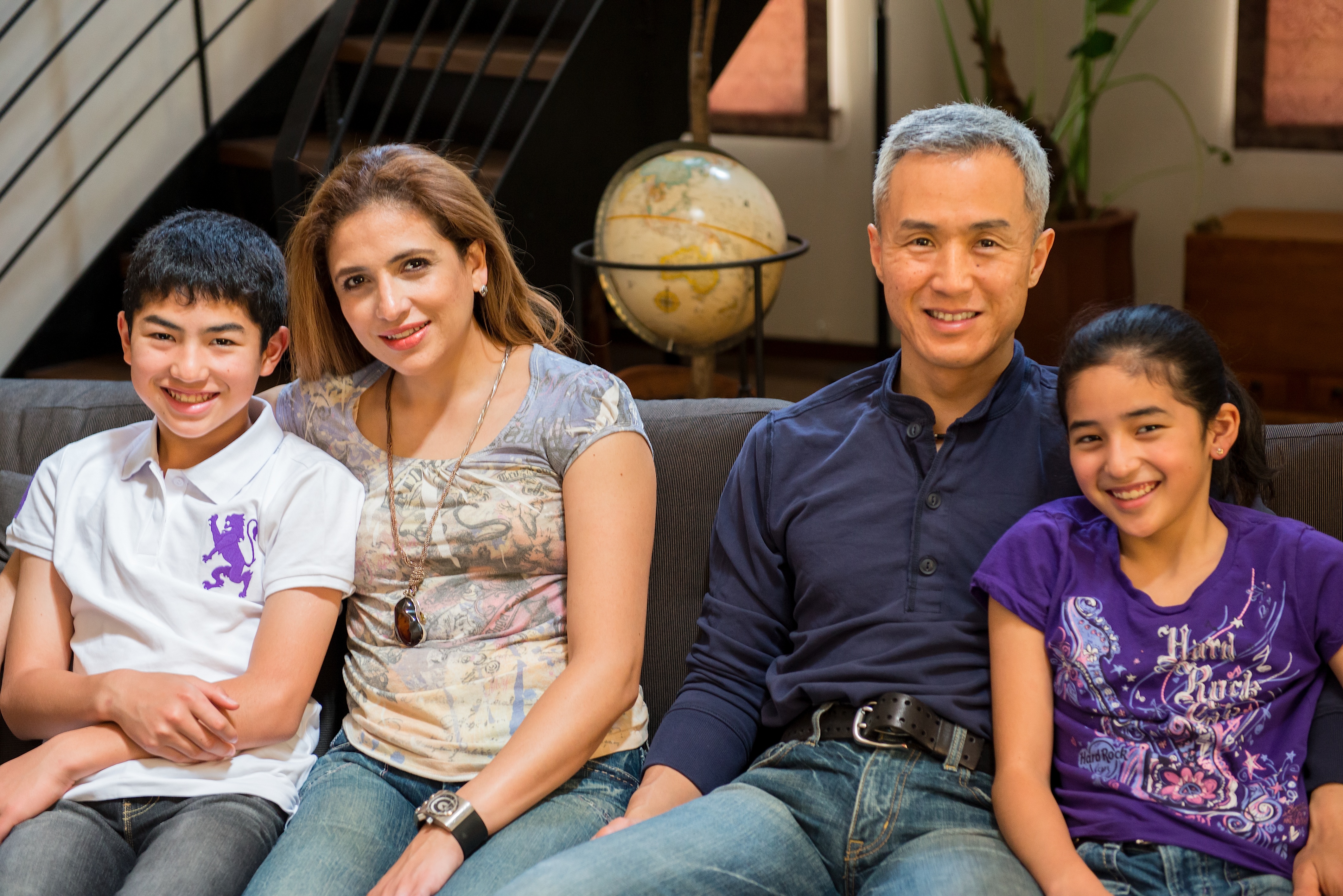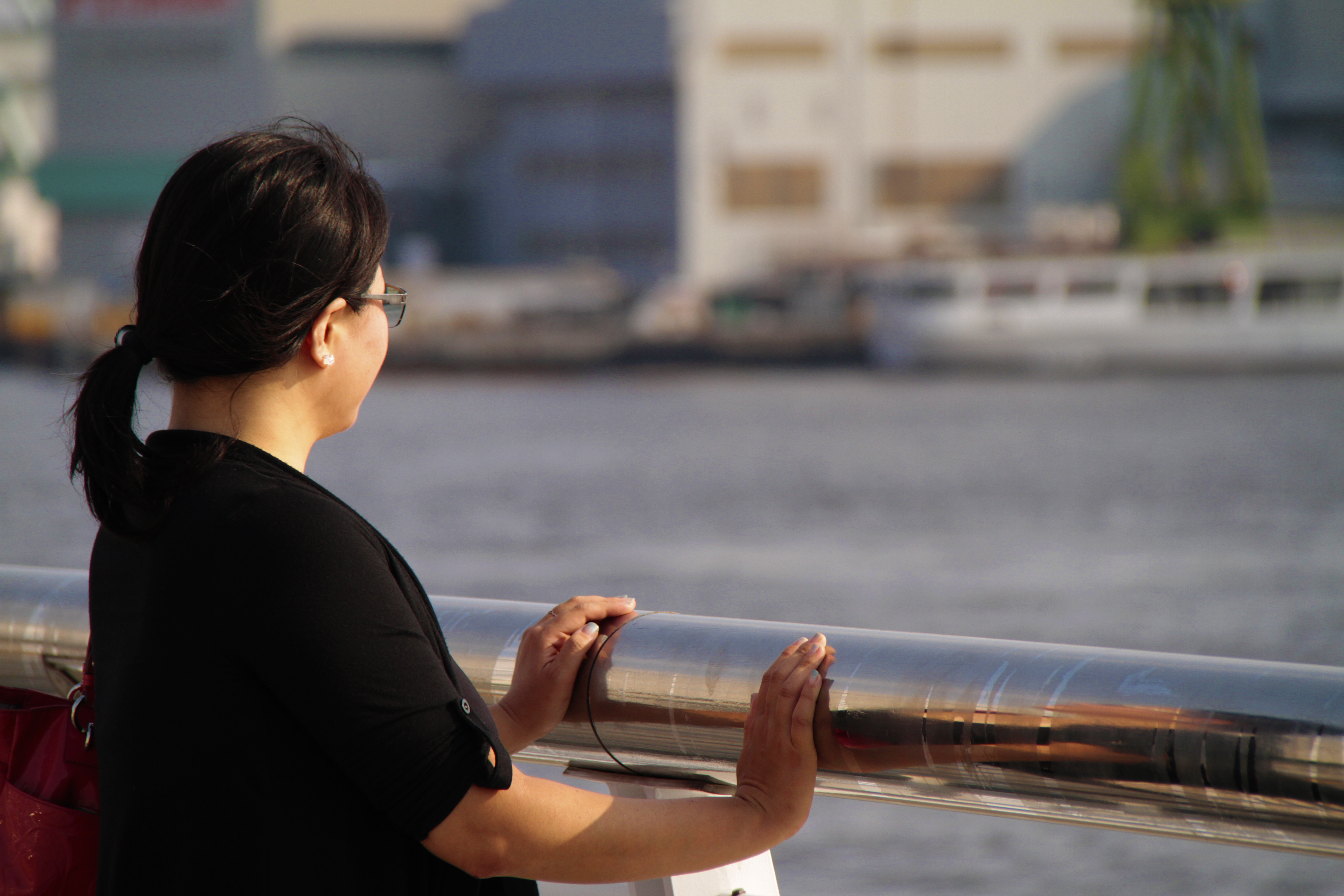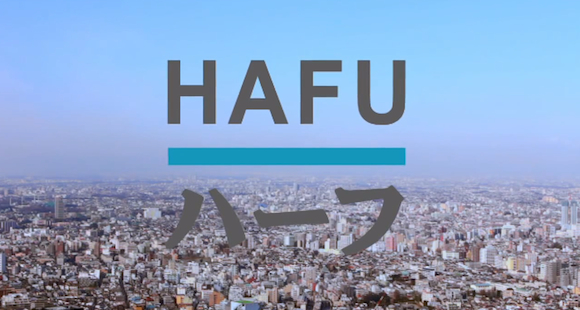
For such a small word, “half” carries an awful lot of weight here in Japan. Adapted to fit the syllabary, the word is pronounced “hafu” in Japanese, and describes a person who has one Japanese – and of course one non-Japanese – parent. More often than not, the word carries certain connotations, and many Japanese have preconceived, often erroneous, notions that hafus have natural English ability, have spent time abroad, and possess many of the physical characteristics Japanese associate with Westerners. At the same time, the word is immediately indicative of something very un-Japanese, and many hafu – even those who have never set foot outside of Japan and speak no other language – are never truly accepted by society as a result.
The Hafu Project was begun in 2009 as an initiative aiming to promote awareness of racial diversity in Japan and the issues facing those of mixed heritage. It was after becoming involved with the project that two filmmakers, Megumi Nishikura and Lara Perez Takagi, began a collaborative work that would eventually become a full-length feature film titled, simply, Hafu.
Three years in the making, Hafu was completed in April this year, and has been screened at independent cinemas everywhere from Madrid to Tokyo. After checking out the film for ourselves when it came to Shibuya recently, RocketNews24 talked with Megumi and Lara to learn a little more about the making of the film and how in their opinion attitudes in Japan are evolving.
Hafu documents the daily lives and experiences of five hafu who have either lived most of their lives in Japan or are visiting for the first time in an effort to learn more about their Japanese heritage. Shot in the documentary style with the featured hafus providing the voiceover throughout, the film has a quiet poignancy to it that at times brought us close to tears, yet ultimately left us feeling both upbeat and confident that attitudes towards hafus in Japan are changing for the better.
Check out the official trailer for the film here:
Hugely impressed by this profoundly moving and inspiring film, RocketNews24 got in touch with Megumi and Lara, who kindly answered our questions about themselves, the making of the film, and how they see life for hafus in Japan changing as the number of children born to mixed-race parents increases each year.

RN24: Tell us a little bit about yourselves. How did you become involved with the Hafu Project?
Megumi: I grew up in Japan as a child but moved with my parents to the United States when I was 15. When I returned [to Japan] at 26, I thought that my identity issues of being half-Japanese were long over. However, living in Japan as an adult for the first time, I was constantly questioned by others: “Where are you from?” – indicating that they didn’t see me as being from Japan – or “Why do you have a Japanese name?”. All this questioning caused me to question my own identity. In my search for answers, I started connecting with other half-Japanese individuals, which is when I came across the Hafu Japanese Project in 2009.
Lara: I was born in Tokyo, to a Japanese mother and a Spanish father. I’ve grown up in several countries – Japan, the USA, Canada, Spain, Australia, etc. Learning three different languages and being surrounded by different cultures made me always feel different to the rest, but also helped me become adaptable to any country I lived in as an adult. My parents made sure I was exposed to both of the cultures they shared, so now I culturally feel Spanish and Japanese, but personality-wise since I’ve lived the longest in Spain, I feel closer to Spain.
When I moved to Japan in 2007, my plan was to improve my language skills and to become more “Japanese” and integrate into society, settling here long-term. But after my first year, I had so many things to think about my identity as it was difficult for me to be recognised. I was constantly questioned by people about my origins and language skills; people were incredulous when I told them that my mother was Japanese and that I was exposed to Japanese culture at home since I was a child.

RN24: What are your overall goals with Hafu?
Megumi: First and foremost, our goal is to create awareness about the hafu experience amongst the general public of Japan. When we first started developing the idea of this film, it was a shock to discover how little information and media attention there was available about the hafu experience. I believe the hafus born in the late 70s and early 80s are the first sizable generation of hafus that are visibly active in society today yet very little about their experience had ever been explored. Personally I believe that in your late twenties that you have enough work and life experience under your belt that what you do can have a significant impact on society. In the film, three of the five stories are people of this same age demographic, and while it was not our intention when we started out to film people necessarily at that age, by the way we can see how they are contributing and shaping society gives us a hint of what Japan might look like when the 1 in 50 hafu babies grow up in 25 years.
Lara: We hope that this film will be seen by as many people as possible, both in and outside of Japan. Our goal is to create awareness of the diversity that exists in Japan, and also start a dialogue about what it means to be Japanese today. For those outside of Japan, we hope they will be able to reflect upon what the mixed-race experience is like in their own country. As the world is diversifying faster than even before, we need to start asking ourselves what changes are needed so that multiracial or multicultural children can grow up with confidence rather than with the fear of being different. We will be happy if our film can even make a small contribution towards that.
 Despite her half-Japanese heritage, Sophia has lived her entire life in Sydney. Her first ever visit to Japan is documented in “Hafu”.
Despite her half-Japanese heritage, Sophia has lived her entire life in Sydney. Her first ever visit to Japan is documented in “Hafu”.
Megumi: Another specific goal related to showing the film in Japan is that we want people to see the reality of hafus. As a result of viewing models and performers exclusively on television, the general public has been fed this idealized image of hafus. According to this ideal, the hafu are “model beautiful,” are mixed with caucasian, and are bilingual. The adoration of hafus has extended as far as magazines offering techniques on how to apply make up so one looks more hafu. Even more extreme, I recently came across a plastic surgeon who offered services to make women look more Western or hafu. I have even come across people who are urayamashii [envious] of hafus, saying that all hafus are beautiful, that they are lucky to be bilingual, that they wish they were hafu themselves or that they want to have hafu children one day so that their children can become models. While these comments can be viewed positively they are also stereotypes and they over simplify the hafu experience; there are many of us who don’t fit that idealized image. I have heard of hafus receiving comments like “Oh you’re an Asian hafu? Well you don’t really count,” or, “You don’t speak English? How mottainai! [What a waste!]” In making this film, we wanted to show that hafus are complex and diverse as any one else out there.

RN24: We definitely have faith that the film will strike a chord with both Japanese and non-Japanese alike. Were there any particular moments during filming that you felt would really resonate with audiences?
Lara: Many different parts of the film show moments in which people can resonate with. For instance in my case, I had the exact same thing happen to me as Sophia [who was raised in Australia] when I brought my Japanese bento [packed lunch] to school. Or when Alex struggles trying to learn between American measurements and currency compared to the metric system and yen, also speaking three languages at home; or with Ed trying to find others like himself using the internet and social networks; David being asked if he’s married to a Japanese… the list is long.
Megumi: It wasn’t until we had our first rough cut screening in December 2011 that I realized how much the film resonated with people–to hear their laughter at moments that I didn’t realize were funny, or to hear that they were moved by scenes where our subject reveal their pain. Also, it was not until we started to screen the film in Japan that I realized how many people, not just hafus, empathise with the stories in the film.
 28-year-old David Yano was born to a Ghanian mother and Japanese father
28-year-old David Yano was born to a Ghanian mother and Japanese father
RN24: Although he has an exceptionally positive outlook on life, one scene in which David describes his feelings after visiting Ghana – the country that most Japanese assume is his home despite the fact that he was born and raised in Japan – struck us as particularly powerful. David says that he never felt especially welcome in Japan during his childhood, but on going to Ghana he felt very much like a foreigner there too. We get the feeling that this sense of “not belonging” in either country is one of the greatest challenges hafu kids growing up in Japan face. Having interviewed so many hafu in Japan, and with your own experiences in mind, what advice would you give to mixed-race families in Japan or hafu struggling to find their place?
Megumi: It certainly can be very challenging when you don’t feel like you belong anywhere, however I think that comes from a sense of looking to the outside world to validate whether you belong or not. That validation ultimately has to come from within. When you figure out and accept who you are then I think people will respond accordingly.
I think for parents I would encourage them to tell their children to not take comments from people too personally and to take pride in what they have been given. It’s important to build confidence in your child so that they enjoy being themselves. No Hafu is a perfect 50/50 blend of their two countries – yet there is some expectation of that – so I think raising children so that they are happy with who they are, and allowing them to explore or not explore the parts of their cultures, that either is okay. I will add, though, that if you have the means to raise your child bilingually by all means do so. Almost all hafu I meet who are monolingual wish their parents made more of an effort to raise them bilingually.
Individually, I think the most important thing is to find something you really enjoy doing–a hobby, a job, an area of study etc. I think when one finds this thing then all those external expectations begin to fall away and naturally out of the joy of doing that activity a sense of self and belonging will emerge.
Lara: Parents play a strong role, and building children’s confidence is the biggest part. Not letting them feel negative about either culture as they grow up is important. But I understand this is hard. When I was a child I had a bad experience in Japan at a summer camp in Chiba, so I automatically felt like neglecting my Japanese side and not wanting anything to do with the culture at all. But thanks to my mother’s determination, I attended Japanese Saturday school and now as an adult I’m thankful for it, despite how much I hated going to school on the weekends. Being aware of the education that you choose for your children is very important, but of course to some extent, if there is a situation where the child is suffering every day, then it is important to find solutions and give the child a chance to regain the confidence that was lost.
To me, visiting both [Spain and Japan] and learning the languages helped me define who I am today. My advice for them is to be proud of who they are and accept the cultures they grow up with. I wish for them to have a strong enough heart and will to not be affected by what society expects from them. You don’t need to be a certain way, you just have to be comfortable with who you are, and when you find that comfort zone, then there shouldn’t be anything you have to worry about.
RN24: At the close of the film, we learn a lot of interesting facts about the number of dual-nationality families and increasing numbers of hafu children in Japan. In what ways do you think that Japan is changing as a result of this?
Lara: With globalisation being more and more present each day the number of international marriages increases and more hafu children are being born. Japan is probably becoming slightly more aware of the diversity that exists within their own country that was actually present since many years ago. They are just slowly recognising what they once ignored.
Megumi: In 2008, Japan officially recognized the Ainu, the indigenous people of Hokkaido. In a presentation I gave at Doshisha Women’s College last year to an all-Japanese audience, more than half the room raised their hands when I asked if they or someone they knew had been in an international relationship. I believe that Japan has always been diverse but it is diversifying at an increasingly rapid rate, however the awareness of this is changing slowly. We hope that our film will raise awareness of this change and start to dissipate the pervasive belief that Japan is mono-ethnic.
There is a strong emphasis on being the same in Japan. In the language, the word “chigau” – different – can also carry the meaning “you are wrong.” I think with an increase in diversity the belief that “different equals wrong” will slowly dissipate. Through this film we want to show that hafus are not so different – in the sense they are human beings with dreams and hopes like anyone else – and even the parts of them that are different are nothing to be fearful of.
Huge thanks goes out to Megumi Nishikura and Lara Perez Takagi for taking the time to answer our questions.
If you’re interested in seeing “Hafu” for yourself, you’ll be pleased to know that along with plans to make the film available on DVD, Blu-ray and on download and streaming video services in 2014, the film is also available worldwide for anyone who wishes to screen it for their community. For more information on screenings and hosting your own event, visit the official Hafu website.
All photos courtesy of Hafu


 Naomi Osaka stirs up debate about what it means to be Japanese following U.S. Open victory
Naomi Osaka stirs up debate about what it means to be Japanese following U.S. Open victory Japanese Americans tell STORIES FROM TOHOKU
Japanese Americans tell STORIES FROM TOHOKU The newest Godzilla movie is coming in November 2023, but fans are concerned it won’t be any good
The newest Godzilla movie is coming in November 2023, but fans are concerned it won’t be any good Japan reacts to Hollywood movie about Hiroshima bombing staring Evan Rachel Wood
Japan reacts to Hollywood movie about Hiroshima bombing staring Evan Rachel Wood Angelina Jolie reunites with son Maddox, Japanese musician Miyavi at Tokyo Maleficent 2 premiere
Angelina Jolie reunites with son Maddox, Japanese musician Miyavi at Tokyo Maleficent 2 premiere Japanese restaurant chain serves Dragon Ball donuts and Senzu Beans this spring
Japanese restaurant chain serves Dragon Ball donuts and Senzu Beans this spring The fish in rural Fukui that rivals Japan’s most auspicious sea bream
The fish in rural Fukui that rivals Japan’s most auspicious sea bream Japan Extreme Budget Travel! A trip from Tokyo to Izumo for just 30,000 yen [Part 1]
Japan Extreme Budget Travel! A trip from Tokyo to Izumo for just 30,000 yen [Part 1] Which convenience store onigiri rice balls are the most popular? Survey reveals surprising results
Which convenience store onigiri rice balls are the most popular? Survey reveals surprising results Japanese drugstore sells onigiri at pre-stupid era prices, but how do they compare to 7-Eleven?
Japanese drugstore sells onigiri at pre-stupid era prices, but how do they compare to 7-Eleven? Japan Extreme Budget Travel! A trip from Tokyo to Izumo for just 30,000 yen [Part 2]
Japan Extreme Budget Travel! A trip from Tokyo to Izumo for just 30,000 yen [Part 2] Starbucks Japan releases first-ever Hinamatsuri Girls’ Day Frappuccino
Starbucks Japan releases first-ever Hinamatsuri Girls’ Day Frappuccino Starbucks Japan releases a new convenience-store exclusive drink
Starbucks Japan releases a new convenience-store exclusive drink Take it From a Native! Recipe for Delicious Japanese Curry as Found at Coco Ichiban
Take it From a Native! Recipe for Delicious Japanese Curry as Found at Coco Ichiban South Korean design company turns subway maps into beautiful artwork you can hang on your wall
South Korean design company turns subway maps into beautiful artwork you can hang on your wall Highest Starbucks in Japan set to open this spring in the Tokyo sky
Highest Starbucks in Japan set to open this spring in the Tokyo sky The 10 most annoying things foreign tourists do on Japanese trains, according to locals
The 10 most annoying things foreign tourists do on Japanese trains, according to locals Tokyo Skytree turns pink for the cherry blossom season
Tokyo Skytree turns pink for the cherry blossom season Yakuzen ramen restaurant in Tokyo is very different to a yakuza ramen restaurant
Yakuzen ramen restaurant in Tokyo is very different to a yakuza ramen restaurant Shibuya Station’s Hachiko Gate and Yamanote Line stairway locations change next month
Shibuya Station’s Hachiko Gate and Yamanote Line stairway locations change next month Starbucks Japan releases new sakura goods and drinkware for cherry blossom season 2026
Starbucks Japan releases new sakura goods and drinkware for cherry blossom season 2026 Starbucks Japan adds new sakura Frappuccino and cherry blossom drinks to the menu
Starbucks Japan adds new sakura Frappuccino and cherry blossom drinks to the menu Japan’s new “Cunte” contact lenses aren’t pronounced like you’re probably thinking they are
Japan’s new “Cunte” contact lenses aren’t pronounced like you’re probably thinking they are Japan’s newest Shinkansen has no seats…or passengers [Video]
Japan’s newest Shinkansen has no seats…or passengers [Video] Foreigners accounting for over 80 percent of off-course skiers needing rescue in Japan’s Hokkaido
Foreigners accounting for over 80 percent of off-course skiers needing rescue in Japan’s Hokkaido Super-salty pizza sends six kids to the hospital in Japan, linguistics blamed
Super-salty pizza sends six kids to the hospital in Japan, linguistics blamed Starbucks Japan unveils new sakura Frappuccino for cherry blossom season 2026
Starbucks Japan unveils new sakura Frappuccino for cherry blossom season 2026 Foreign tourists in Japan will get free Shinkansen tickets to promote regional tourism
Foreign tourists in Japan will get free Shinkansen tickets to promote regional tourism Take a trip to Japan’s Dododo Land, the most irritating place on Earth
Take a trip to Japan’s Dododo Land, the most irritating place on Earth Naruto and Converse team up for new line of shinobi sneakers[Photos]
Naruto and Converse team up for new line of shinobi sneakers[Photos] Is China’s don’t-go-to-Japan warning affecting the lines at a popular Tokyo gyukatsu restaurant?
Is China’s don’t-go-to-Japan warning affecting the lines at a popular Tokyo gyukatsu restaurant? Survey asks foreign tourists what bothered them in Japan, more than half gave same answer
Survey asks foreign tourists what bothered them in Japan, more than half gave same answer Japan’s human washing machines will go on sale to general public, demos to be held in Tokyo
Japan’s human washing machines will go on sale to general public, demos to be held in Tokyo Starbucks Japan releases new drinkware and goods for Valentine’s Day
Starbucks Japan releases new drinkware and goods for Valentine’s Day We deeply regret going into this tunnel on our walk in the mountains of Japan
We deeply regret going into this tunnel on our walk in the mountains of Japan Studio Ghibli releases Kodama forest spirits from Princess Mononoke to light up your home
Studio Ghibli releases Kodama forest spirits from Princess Mononoke to light up your home Major Japanese hotel chain says reservations via overseas booking sites may not be valid
Major Japanese hotel chain says reservations via overseas booking sites may not be valid Put sesame oil in your coffee? Japanese maker says it’s the best way to start your day【Taste test】
Put sesame oil in your coffee? Japanese maker says it’s the best way to start your day【Taste test】 No more using real katana for tourism activities, Japan’s National Police Agency says
No more using real katana for tourism activities, Japan’s National Police Agency says Video game director/composer Yumi Hashimoto tells us about Japan’s indie scene and her newest title
Video game director/composer Yumi Hashimoto tells us about Japan’s indie scene and her newest title R-rated movie “Chappie” gets severely nerfed for Japan release, director knew nothing about it
R-rated movie “Chappie” gets severely nerfed for Japan release, director knew nothing about it Someone found Pixar’s Nemo in real life, and he’s trapped in Japan!
Someone found Pixar’s Nemo in real life, and he’s trapped in Japan! The slogans for every Studio Ghibli movie, ranked by fans in Japan【Quiz】
The slogans for every Studio Ghibli movie, ranked by fans in Japan【Quiz】 4 Days in Tohoku, Japan’s Northeastern Treasureland
4 Days in Tohoku, Japan’s Northeastern Treasureland